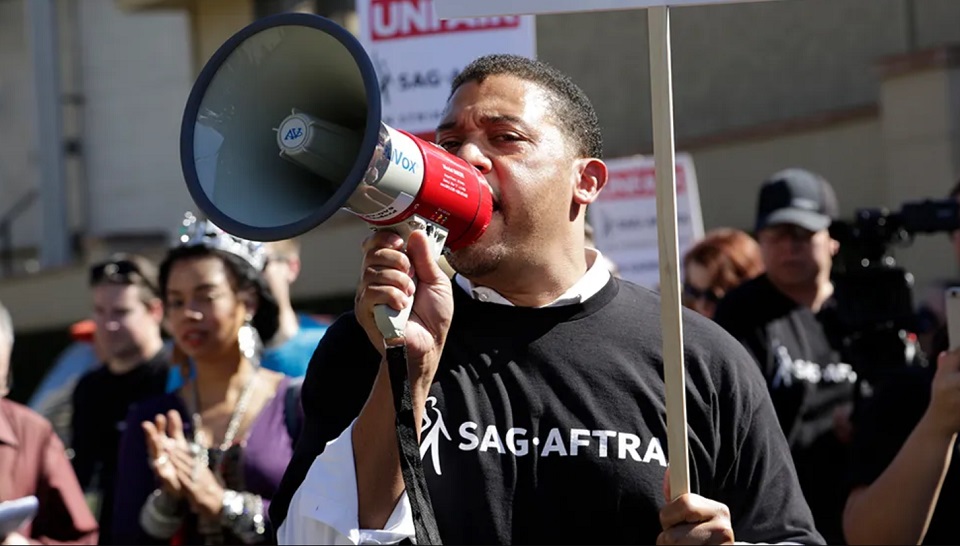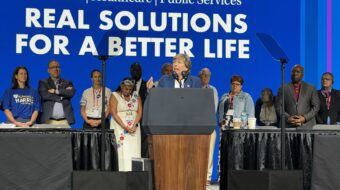
HOLLYWOOD, Calif.—After large rallies in Los Angeles and New York City, bargaining between the Writers Guild of America and the Hollywood and New York bosses of streaming videos, TV networks, and motion picture studios resumed as members of both that union and SAG-AFTRA continued to walk picket lines. But then the bosses didn’t budge and negotiations halted.
The Association of Motion Picture and Television Producers (AMPTP) forced both unions, first the Guild and then the actors, out on strike over similar issues. The Guild was forced out on May 2. SAG-AFTRA and its tens of thousands of members were forced out on July 14.
They’ve walked the picket lines ever since. Both also staged mass rallies, on a “National Union Solidarity Day” in mid-August. The Los Angeles rally drew more than 5,000 people in front of Warner Brothers headquarters. Hundreds massed at Philadelphia City Hall, thousands covered Chicago’s Grant Park and dozens leafletted in front of the D.C. headquarters of the movie studios’ lobby.
“It’s not OK for other people to benefit from our hard work and sweat. It’s not OK for other people to benefit while we work 16-hour days. It’s not OK for other people to benefit while we put our vulnerability and our hearts on the line,” performer Kerry Washington told the L.A. crowd. “It’s not OK for other people to benefit while we do the hard work.
“We deserve to be paid a fair wage. We deserve access to health care. We deserve to be protected from machines pretending to be us,” she said, referring to studios’ increasing use of artificial intelligence, to copy writers’ words and to create computer-generated images and voices of performers, which then can be used forever—without paying the workers anything extra.
In Manhattan, several hundred marchers created a two-block picket line outside the corporate offices of two AMPTP members, Amazon and HBO. Unionized teachers, nurses, truckers, musicians, retail workers, and hotel workers joined the writers and SAG-AFTRA members there.
New York speakers often paused, interrupted by air horns from supportive passing truckers.
One heavyweight political speaker, State Senate Labor Committee Chair Jessica Ramos, D-Queens, opened her speech in support by mistakenly saying the Writers Guild members had been forced out on strike for “the past 100 years.” She quickly corrected herself to say “100 days,” as everyone cracked up. “It felt like 100 years,” said Ramos.
Issues for members of both unions include declining pay, cuts in workloads, lack of residuals, and the threat that bosses’ increasing use of artificial intelligence to take one likeness and voiceover of a performer or script by a writer and use it over and over and over again with no further work and no further pay would put huge numbers of actors and writers out of jobs.
The latest talks between the Writers Guild and the AMPTP resumed on August 11, and saw the bosses “presenting us for the first time with a counteroffer,” union bargainers told members on August 22. After a week of bargaining, top studio CEOs such as Disney chief Bob Iger joined the talks but declared “it was past time to settle”—on the bosses’ terms.
Met with only a lecture
“On the 113th day of the strike–and while SAG-AFTRA is walking the picket lines by our side–we were met with a lecture about how good their single and only counteroffer was,” the Writers Guild bargainers said. After pointing out AMPTP’s “limitations and loopholes” in its counteroffer, Guild bargainers said the strike could be settled by real AMPTP answers “to all, not just some, of the problems they [AMPTP] created in the workplace.”
The bosses responded by cutting off the talks and releasing a summary of their “offer” to the public. “This wasn’t a meeting to make a deal. This was a meeting to get us to cave…not to bargain” and “to bet that we will turn on each other,” the Writers Guild replied.
But even as the WGA talks with the bosses were going nowhere, several outside developments augured well for the two unions and their members.
One was an independent poll, posted on the AFL-CIO website, showing strong and continuing bipartisan public support for the workers and against the studios. Respondents also, by large majorities, said they would continue to support the workers even if the two forced strikes led to cancellation of favorite programming down the line.
The 1,124 likely voters broke 54%-28% for unions in general, with Democrats at 71%-14%, independents at 47%-32%, and Republicans tied at 40%-41%. The percentages were almost identical in support of SAG-AFTRA and the Writers Guild strikes, with one exception: The GOP joined the consensus, 49%-30%. The margins of error were plus or minus three percentage points.
The public trashed the studios 31%-48%, even though Democrats favored the studios by four percentage points. Independents turned against the studio bosses by 29% for but 50% against. Republicans trashed the moguls by almost a three-to-one ratio.
The second was a court ruling which could slam the studios’ use of AI—and their use of it to deprive workers of jobs and income. U.S. District Judge Beryl Howell in D.C. decided works created by artificial intelligence can’t be copyrighted.
“Copyright law has never stretched so far” to “protect works generated by new forms of technology operating absent any guiding human hand,” Howell found in a case which didn’t come from the industries that forced the workers to strike. “Human authorship is a bedrock requirement.”
AMPTP bosses increasingly turn to AI, where they can film a performer and record their voice just once, then computer-generate it over and over and over again into the future. AI can also be used against the writers, reducing their script-writing duties to just one day’s work.
In short, AI threatens to reduce already shrunken workdays on streaming videos, movies, TV shows, and the like to one-day sessions—and one day’s pay, while the studios continue to make millions forever by duplicating the writers’ and performers’ work endlessly.
And Deadline reported The New York Film and Television Union Coalition is praising identical bills pending in the state legislature to “prohibit applicants to the Empire State film production [tax] credit from using artificial intelligence that would displace any natural person in their productions.”
The coalition includes SAG-AFTRA, the Writers Guild of America-East—which represents stage and video performers–the Directors Guild, the Cinematographers Guild (IATSE Local 600), the Editors Guild (IATSE Local 700), United Scenic Artists (IATSE Local 829), IATSE Local 52 and Teamsters Local 817.
We hope you appreciated this article. At People’s World, we believe news and information should be free and accessible to all, but we need your help. Our journalism is free of corporate influence and paywalls because we are totally reader-supported. Only you, our readers and supporters, make this possible. If you enjoy reading People’s World and the stories we bring you, please support our work by donating or becoming a monthly sustainer today. Thank you!












Comments